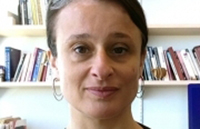
CERLAC Director and Associate Professor of Anthropology Carlota McAllister has been awarded a Faculty Fellowship at the Charles Warren Center for Studies in American History at Harvard University. She will spend the 2016-17 academic year as a Visiting Scholar at the center.
Each year, the cohort of Warren Center Fellows participate in a themed seminar. The 2016-17 Fellows’ theme is “Imagining History, Doing Politics: The Uses and Disadvantages of the Past.” Scholars working on different periods of history in the Americas will investigate how invocations and imaginings of the historical past have provided the foundation for political thought and action in an array of hemispheric settings. The seminar’s aim is to investigate how people recover and construct the past to situate their struggles in the present and envision possible futures. The seminar will also consider the ethical, aesthetic, epistemological and political questions raised by historical memory.
McAllister’s fellowship project is titled “The Last Frontier: Histories of Property-Making as Resistance to Dispossession in Chilean Patagonia.” She will explore how small-scale ranchers (the Ayseninos) in the remote Aysén region of Patagonia drew on techniques of property-making derived from their past as frontiers people to resist attempts by large-scale conservationists and mega dam projects to transform this territory.
Through repeated invocations of local practices of branding, breeding, clearing, fencing, herding, and road-opening, the ranchers sketch the contours of a Patagonian nation characterized by radical self-sufficiency, extraordinary endurance in the face of nature, and deep knowledge of the landscape and its human and non-human denizens.
In 2012, this nation briefly acquired a territorial form, when the Ayseninos mobilized to shut down all points of entry into the region. Reflecting on this uprising, McAllister will examine what resources past projects of capital accumulation offer those who seek to challenge capitalism’s ongoing expansion.


